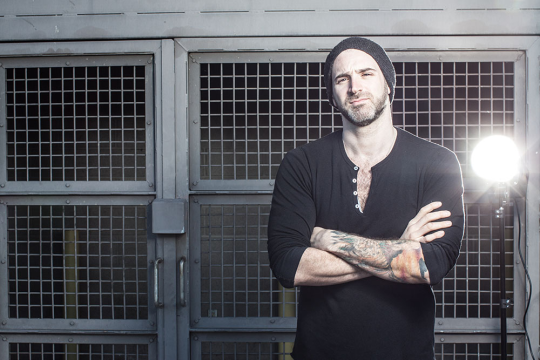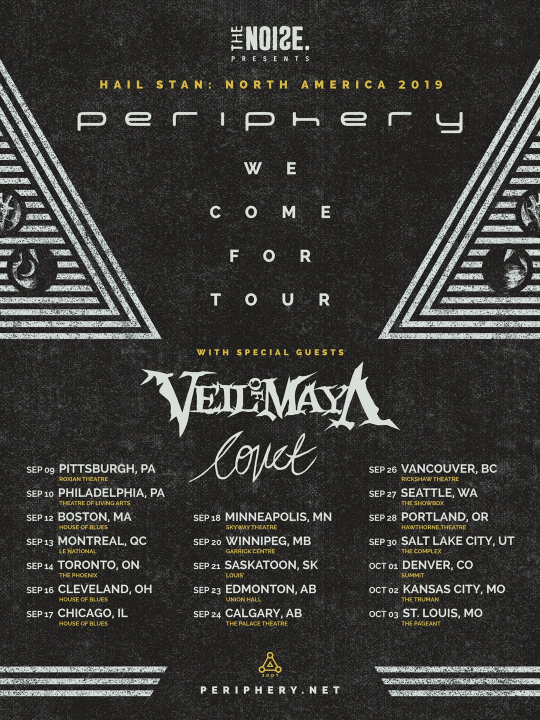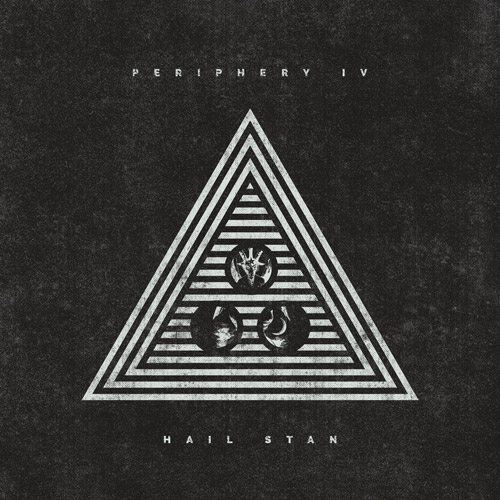
Unless you’ve been purposely avoiding the internet since early April, we imagine you’re probably pretty familiar with Periphery’s brand new, self-released album Hail Stan.
Serving as their first LP since leaving Sumerian Records, Periphery’s 64-minute, 9-track offering is a non-stop display of musical magnificence. Providing soaring highs and devastating lows, Periphery’s sixth full-length record, like all in their distinguished discography, is nothing short of perfection.
Now five months after Hail Stan’s release, the progressive metal outfit is ready to finally take their new music out on the road for a Noise presented headlining tour with Veil Of Maya and Covet. Talking to drummer Matt Halpern, it’s clear the band is itching to hit the road on their first headliner since 2017.
“We’ve had all summer off to kind of work on other things and be thinking about this tour and planning this tour,” he said. “There’s been a lot of work that has gone into it between the band and our team promoting it, setting it up and working with you guys. So we’re just excited to finally see it come to life.”
Diving into more with Halpern, we were able to discuss what to expect on Periphery’s upcoming tour (like if they’ll be playing “Reptile” or not) as well as the band’s new self-run record label 3DOT Recordings.
To check out our chat with the business-savvy musician and entrepreneur, be sure to look below. Afterward, make sure to grab tickets to see Periphery out on tour here.

With it being a while since you guys have done a proper headlining tour, is there anything special you have planned for these dates?
Matt Halpern: We’re just really excited to play a majority of new material. We put out a record earlier this year and we’ve only played a couple [new] songs live on the other tours we’ve done with Dance Gavin Dance and our South American tour earlier this year. I think the majority of our set on this North American headliner is going to be new songs. So we’re excited for sure about that.
A lot of fans have been wondering if you’re going to play your 16-minute track “Reptile” live. Has that been discussed at all?
That’s the plan. We start rehearsals this week so that’s the plan to make sure that one is in the set. I think that’s been the favorite song on the record for all of us, I think collectively, so it was a no-brainer when it came to this tour. Like, we have to play it. It has to happen.
That’s exciting. When it comes to playing a 16-minute song is there some extra cardio that you have to do to get yourself ready for that?
Not really. Most of our songs are pretty long-winded anyway. It’s really all the same, to be honest. You know, an hour-long set is an hour-long set whether it’s comprised of three really long songs or 10 short songs. It’s all pretty much the same. I think more so, I’m just excited to see how the crowd reacts to such a long song because that’s really the thing. Like, if we can keep everybody’s attention for those 16 minutes straight during that one song and have them totally into it, I think that’s the challenge. And that’s the goal, you know, so we just got to nail it.
That’s a very good point. Aside from “Reptile,” which song are you the most excited to play off the new record?
I honestly think it’s that one. If I had to pick another that I enjoy playing, I’ve always really enjoyed playing “Blood Eagle.” We’ve been playing that one live now for the past couple tours. I did some drum clinics earlier this year as well where I played that pretty much every night and that is a super fun, aggressive song to play. It’s definitely challenging but I just really enjoyed laying it down and watching the crowd go nuts with that one because it’s really engaging and it’s really heavy.
For this tour, you’re supporting Periphery’s first-ever self-released album Hail Stan. What’s that process been like so far? Has it been an easy transition or has there been a few hurdles?
There’s definitely always hurdles and there’s a new challenge that we are faced with pretty much every week. But we have such a good, experienced team behind us that is really helping us drive not only this record but the record label too. Any challenge that we’ve run into, someone on our team has either dealt with something like that before and knows exactly what to do or collectively is just creative enough to kind of solve whatever is thrown at us. So it’s definitely not easy but we’re very, very lucky to have awesome people on our team that are just freaking great at what they do.
So personally, knowing what you know now, you still feel good that you guys self-released Hail Stan?
Oh, 100%. Starting our own label and self-releasing has been a goal since I joined the band 10 years ago. That’s been something we’ve been talking about and really long term we’ve been working towards and planning for more and more strategically and aggressively as the years went on. But when it came time for us to be able to do it, it wasn’t a decision that we made at that time on a whim. It was very well thought out, very strategic. And it was something we let our manager Wayne know from the day we started working together – which was now, I want to say like four or five years ago. So you know, even when we started working with him, that was part of our decision. He probably doesn’t like me saying this because he likes to stay in the background (which is also why I love him) but he has tons of label experience. So between his ability as a manager and then all his years and years and years of working at record labels, you know, he was part of that strategy for sure.

What’s interesting about your label 3DOT Recordings is that some bands can barely even handle their own band business together. You guys, on the other hand, collaborate on the band stuff and a record label together.
That’s a really nice perspective you have, especially if you consider us to kind of fall into that perspective. I do think for us, you know, it’s kind of one and the same. As far as the band members go, we’ve all been working together with the band as a business and with that being the focus since we started. So we had to learn pretty quickly how to work together from a business perspective, not just from the musical perspective. And that right there definitely helped prepare us to take on more work that falls into that category of running a business, running a label, learning how to put out music. All that stuff is very much combined and intertwined in certain ways.
What I’m getting at with this is that we bring in Wayne, who really knows how to make it all work together, make all of us work together. He’s managing us, he’s managing the business, he’s managing our band, he’s managing the label. And from day one, when he joined, one of the things that he really instilled in the band was needing to have weekly meetings, weekly calls. And on those weekly calls, since he’s been on board, they’ve been equally divided to discuss band business and then label business. So it’s all kind of combined into one. And when we put our heads together, collectively, which we do every week, we’re all focusing on not only the band but also the label and any decisions or any sort of tasks that get assigned during that time period. It’s something that we can all sort of divide and conquer. And it never seems to be too much for anybody because we all have learned over the years that we have skills, we have strengths, we have weaknesses and we do our parts where we can. We find that shit gets done that way. So I know that was kind of long-winded but hopefully it sort of illuminates how it all works for us.
When you get the chance to talk to younger up-and-coming bands or even your students, is that something you recommend to them? Focus on your band as a business?
Yes. I mean, it is [a business] right? When you’re starting a band, you’re an entrepreneur. Especially when, well, I shouldn’t even say especially – that’s what you are, period. And the people you end up working with – whether it be a manager, a booking agent or whoever it is – those are your partners. Those are people that work with your business. But your business is music, right? Your product is music. The band is the product. The artwork is the product. How it all works together, how it all gets released, all of that is the strategy and the marketing. I mean, it’s a business. You got to have money to run it. You have to figure out how you’re going to be able to pay the bills. You’re going to figure out how to pay each other, how to pay for food.
It’s funny, like any business, when you start you’re usually starting from the ground up with very limited budget and very limited funds. And you got to really take the risk and be willing to not make a dime for a long time and reinvest and reinvest in order to grow whatever it is you’re doing. And a band is the exact same way. We’re no exception to that. When we started, we invested everything back into the band for years and years and years. We barely made a penny on tour, a penny from our records. Everything went back into the band. And even now, as we look at what we do from whether it’s a tour, or whether it’s a record, or whatever it is, it’s very much laid out in terms of key points of any business where we look at the budget for things. We look at what needs to be done for marketing, we look at what the product is itself, we set aside different timelines for things, we focus on what’s most important and what can come later.
Anyway, long story short: Anybody in a band, anybody wanting to start a band or work within music needs to think of themselves and the music as a business. I will say as a caveat, before I wrap up this whole spiel, you can’t have a business as a band unless you have music. At the end of the day, music is the most important thing. You don’t have to be the best at the business side. You can learn those things and hopefully somebody in the band or everybody in the band can focus on their strengths and kind of make that part work. But the music is the most important. You can’t market and try to sell a shitty product. I think nowadays there are just so many ways to be able to focus on making good music and making it sound good. There are easy ways to create and we’re seeing this across tons of different genres. So at the very core of all of this, for any band that wants to start and wants to be a business, you got to make sure you realize what it is you’re selling and what it is you’re doing – and that is making music that matters to you. And that’s the point I wanted to get to, which is don’t make music that you think other people are going to want to hear. Make music that you enjoy making for yourself. If you are really passionate about it and you want to get it out there to other people, then you will figure out all the necessary steps to make it into a business that surrounds your core product. So hopefully that makes sense and doesn’t bore the hell out of anyone [laughs].
No way, that’s some valuable stuff bands really need to hear. When it comes to writing and recording though, do you have to put all the business stuff aside when you’re in the studio? What are your tips to block out business when you’re focusing on the art side of the music?
I mean, we really just make [music] the priority. There is no tour without a record to promote. There’s no music to share or post about or get up on a streaming platform unless we create it first. So when we do go into a period of creativity and writing, we don’t do anything else. That’s why we didn’t tour in all of 2018. We took off the whole year basically to write our record and to devote as much time as we possibly could need in order to have a product that we were all going to be happy with. Then we could put on the business hats and kind of run with that side. Now, that being said, we’re lucky enough to be at a point where we can have a manager like Wayne, who while we’re doing all of the creative stuff, he’s totally focused on what’s going to happen in the next six months, 12 months, 18 months, two years, based on what we create in the studio. And then he catches us up to it once we have the music written and then we all get on board.
Talking about the writing and recording for Hail Stan, it feels like there are songs reminiscent of all Periphery eras. Was that intentional or just a coincidence?
No, I don’t think we ever really have a specific plan. I think the only record we’ve ever really sat down and said “this is going to be something [specific]” was when we did the Juggernaut records and we said that was going to be a concept album, a story. But that aside, for Hail Stan, we just kind of said, “Look, we want to write what feels good. This is our first record on our own label. We want to represent us very accurately as to where we are as a band right now and what’s inspiring us.” And we just wrote and wrote and wrote and we went back and just said, “Hey, by the way, here’s this old riff that we’ve never been able to use. Fuck it, let’s see where we can make it fit.” And we did.
But I don’t think there was ever a strategy or a specific plan to say, “this is what the record is going to be like.” I think we just knew we didn’t want to have a super long record which is why we were aiming for nine to 10 songs. Ironically, when you start writing, you get five minutes into a song, then you keep going. And next thing you know, you look up and it’s eight minutes. And then next thing you know, you look up and it’s 60 minutes long. And that’s the thing, we could have never planned to write a 16-minute song. That is a total happy accident we were all just open to. And I think that’s the key, we were really open to whatever [this album] was going to be. Everybody contributes, everybody keeps an open mind. Everybody pays attention to what inspires them. And then whatever collectively inspires us all as a group is what we focused on. So we may have had like 20 or 25 demos to pick from but the ones we focused on were the ones that all five of us could really get behind to be like, “Yeah, let’s do this.” So no, I think it’s just a natural progression and a natural outcome that occurred because we didn’t feel pressure. We had as much time as we needed and it ended up actually allowing us to write faster and more definitively because we didn’t have any outside pressure.
With this record having a good mix of heavier and softer songs, do you have a preference when it comes to what you’re playing?
I like all of it for different reasons. I mean, it’s fun to play the really heavy stuff. Especially when you’re really energized or in an aggressive mood. I mean, it’s great to play those songs because you can really let it out. But I think I’ve always been partial to the more rock-based stuff that we do. I always find myself gravitating towards the songs that have more, I guess, singing melodies. I’ve always liked them more. I’ve always gravitated to the groovy stuff we play just because as a drummer, I would much rather figure out ways to play grooves than to just play stuff that’s fast or heavier or hard. You know, I like the creative side of drumming that we inject into our music. So yeah, I’m always partial to the more groovy rock stuff. But again, I like it all. It just depends on the mood of it.
Last question: Will you be doing any drum lessons on this tour?
It’s funny, I started teaching on our very first tour, back in 2009. And I’ve done it on every tour since. I don’t think I’ll stop. So that being said, yeah, I’m teaching pretty much every day on this tour that we’re doing and all subsequent tours from there. So yeah, every day. Doing drum lessons.




